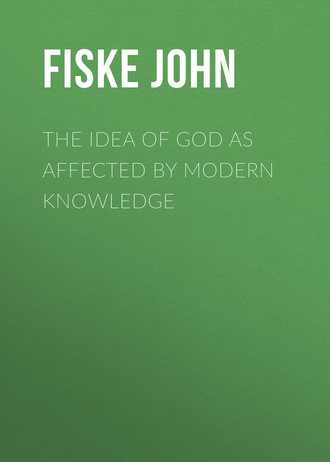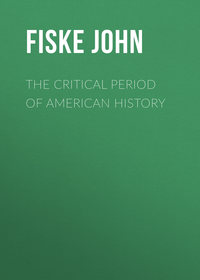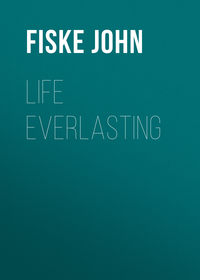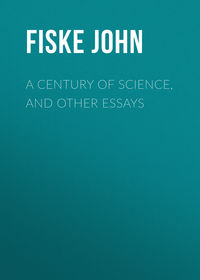 полная версия
полная версияThe Idea of God as Affected by Modern Knowledge
If we could cross-question all the men and women we know, and still more all the children, we should probably find that, even in this enlightened age, the conceptions of Deity current throughout the civilized world contain much that is in the crudest sense anthropomorphic. Such, at any rate, seems to be the character of the conceptions with which we start in life. With those whose studies lead them to ponder upon the subject in the light of enlarged experience, these conceptions become greatly modified. They lose their anthropomorphic definiteness, they grow vague by reason of their expansion, they become recognized as largely symbolic, but they never quite lose all traces of their primitive form. Indeed, as I said a moment ago, they cannot do so. The utter demolition of anthropomorphism would be the demolition of theism. We have now to see what traces of its primitive form the idea of God can retain, in the light of our modern knowledge of the universe.
IX
The Argument from DesignThe most highly refined and scientific form of anthropomorphic theism is that which we are accustomed to associate with Paley and the authors of the Bridgewater treatises. It is not peculiar to Christianity, since it has been held by pagans and unbelievers as firmly as by the devoutest members of the church. The argument from design is as old as Sokrates, and was relied on by Voltaire and the English deists of the eighteenth century no less than by Dr. Chalmers and Sir Charles Bell. Upon this theory the universe is supposed to have been created by a Being possessed of intelligence and volition essentially similar to the intelligence and volition of Man. This Being is actuated by a desire for the good of his creatures, and in pursuance thereof entertains purposes and adapts means to ends with consummate ingenuity. The process by which the world was created was analogous to manufacture, as being the work of an intelligent artist operating upon unintelligent materials objectively existing. It is in accordance with this theory that books on natural theology, as well as those text-books of science which deem it edifying to introduce theological reflections where they have no proper place, are fond of speaking of the "Divine Architect" or the "Great Designer."
This theory, which is still commonly held, was in high favour during the earlier part of the present century. In view of the great and sudden advances which physical knowledge was making, it seemed well worth while to consecrate science to the service of theology; and at the same time, in emphasizing the argument from design, theology adopted the methods of science. The attempt to discover evidences of beneficent purpose in the structure of the eye and ear, in the distribution of plants and animals over the earth's surface, in the shapes of the planetary orbits and the inclinations of their axes, or in any other of the innumerable arrangements of nature, was an attempt at true induction; and high praise is due to the able men who have devoted their energies to reinforcing the argument. By far the greater part of the evidence was naturally drawn from the organic world, which began to be comprehensively studied in the mutual relations of all its parts in the time of Lamarck and Cuvier. The organic world is full of unspeakably beautiful and wonderful adaptations between organisms and their environments, as well as between the various parts of the same organism. The unmistakable end of these adaptations is the welfare of the animal or plant; they conduce to length and completeness of life, to the permanence and prosperity of the species. For some time, therefore, the arguments of natural theology seemed to be victorious along the whole line. The same kind of reasoning was pushed farther and farther to explain the classification and morphology of plants and animals; until the climax was reached in Agassiz's remarkable "Essay on Classification," published in 1859, in which every organic form was not only regarded as a concrete thought of the Creator interpretable by the human mind, but this kind of explanation was expressly urged as a substitute for inquiries into the physical causes whereby such forms might have been originated.
In its best days, however, there was a serious weakness in the argument from design, which was ably pointed out by Mr. Mill, in an essay wherein he accords much more weight to the general argument than could now by any possibility be granted it. Its fault was the familiar logical weakness of proving too much. The very success of the argument in showing the world to have been the work of an intelligent Designer made it impossible to suppose that Creator to be at once omnipotent and absolutely benevolent. For nothing can be clearer than that Nature is full of cruelty and maladaptation. In every part of the animal world we find implements of torture surpassing in devilish ingenuity anything that was ever seen in the dungeons of the Inquisition. We are introduced to a scene of incessant and universal strife, of which it is not apparent on the surface that the outcome is the good or the happiness of anything that is sentient. In pre-Darwinian times, before we had gone below the surface, no such outcome was discernible. Often, indeed, we find the higher life wantonly sacrificed to the lower, as instanced by the myriads of parasites apparently created for no other purpose than to prey upon creatures better than themselves. Such considerations bring up, with renewed emphasis, the everlasting problem of the origin of evil. If the Creator of such a world is omnipotent he cannot be actuated solely by a desire for the welfare of his creatures, but must have other ends in view to which this is in some measure subordinated. Or if he is absolutely benevolent, then he cannot be omnipotent, but there is something in the nature of things which sets limits to his creative power. This dilemma is as old as human thinking, and it still remains a stumbling-block in the way of any theory of the universe that can possibly be devised. But it is an obstacle especially formidable to any kind of anthropomorphic theism. For the only avenue of escape is the assumption of an inscrutable mystery which would contain the solution of the problem if the human intellect could only penetrate so far; and the more closely we invite a comparison between divine and human methods of working, the more do we close up that only outlet.
The practical solution oftenest adopted has been that which sacrifices the Creator's omnipotence in favour of his benevolence. In the noblest of the purely Aryan religions – that of which the sacred literature is contained in the Zendavesta – the evil spirit Ahriman exists independently of the will of the good Ormuzd, and is accountable for all the sin in the world, but in the fullness of time he is to be bound in chains and shorn of his power for mischief.21 This theory has passed into Christendom in the form of Manichæism; but its essential features have been adopted by orthodox Christianity, which at the same time has tried to grasp the other horn of the dilemma and save the omnipotence of the Deity by paying him what Mr. Mill calls the doubtful compliment of making him the creator of the devil. By this device the essential polytheism of the conception is thinly veiled. The confusion of thought has been persistently blinked by the popular mind; but among the profoundest thinkers of the Aryan race there have been two who have explicitly adopted the solution which limits the Creator's power. One of these was Plato, who held that God's perfect goodness has been partially thwarted by the intractableness of the materials he has had to work with. This theory was carried to extremes by those Gnostics who believed that God's work consisted in redeeming a world originally created by the devil, and in orthodox Christianity it gave rise to the Augustinian doctrine of total depravity, and the "philosophy of the plan of salvation" founded thereon. The other great thinker who adopted a similar solution was Leibnitz. In his famous theory of optimism the world is by no means represented as perfect; it is only the best of all possible worlds, the best the Creator could make out of the materials at hand. In recent times Mr. Mill shows a marked preference for this view, and one of the foremost religious teachers now living, Dr. Martineau, falls into a parallel line of thinking in his suggestion that the primary qualities of matter constitute a "datum objective to God," who, "in shaping the orbits out of immensity, and determining seasons out of eternity, could but follow the laws of curvature, measure, and proportion."22
But indeed it is not necessary to refer to the problem of evil in order to show that the argument from design cannot prove the existence of an omnipotent and benevolent Designer. It is not omnipotence that contrives and plans and adapts means to ends. These are the methods of finite intelligence; they imply the overcoming of obstacles; and to ascribe them to omnipotence is to combine words that severally possess meanings into a phrase that has no meaning. "God said, Let there be light: and there was light." In this noble description of creative omnipotence one would search in vain for any hint of contrivance. The most the argument from design could legitimately hope to accomplish was to make it seem probable that the universe was wrought into its present shape by an intelligent and benevolent Being immeasurably superior to Man, but far from infinite in power and resources. Such an argument hardly rises to the level of true theism.23
X
Simile of the Watch replaced by Simile of the FlowerIt was in its own chosen stronghold that this once famous argument was destined to meet its doom. It was in the adaptations of the organic world, in the manifold harmonies between living creatures and surrounding circumstances, that it had seemed to find its chief support; and now came the Darwinian theory of natural selection, and in the twinkling of an eye knocked all this support from under it. It is not that the organism and its environment have been adapted to each other by an exercise of creative intelligence, but it is that the organism is necessarily fitted to the environment because in the perennial slaughter that has gone on from the beginning only the fittest have survived. Or, as it has been otherwise expressed, "the earth is suited to its inhabitants because it has produced them, and only such as suit it live." In the struggle for existence no individual peculiarity, however slight, that tends to the preservation of life is neglected. It is unerringly seized upon and propagated by natural selection, and from the cumulative action of such slight causes have come the beautiful adaptations of which the organic world is full. The demonstration of this point, through the labours of a whole generation of naturalists, has been one of the most notable achievements of modern science, and to the theistic arguments of Paley and the Bridgewater treatises it has dealt destruction.
But the Darwinian theory of natural selection does not stand alone. It is part of a greater whole. It is the most conspicuous portion of that doctrine of evolution in which all the results hitherto attained by the great modern scientific movement are codified, and which Herbert Spencer had already begun to set forth in its main outlines before the Darwinian theory had been made known to the world. This doctrine of evolution so far extends the range of our vision through past and future time as entirely to alter our conception of the universe. Our grandfathers, in common with all preceding generations of men, could and did suppose that at some particular moment in the past eternity the world was created in very much the shape which it has at present. But our modern knowledge does not allow us to suppose anything of the sort. We can carry back our thoughts through a long succession of great epochs, some of them many millions of years in duration, in each of which the innumerable forms of life that covered the earth were very different from what they were in all the others, and in even the nearest of which they were notably different from what they are now. We can go back still farther to the eras when the earth was a whirling ball of vapour, or when it formed an equatorial belt upon a sun two hundred million miles in diameter, or when the sun itself was but a giant nebula from which as yet no planet had been born. And through all the vast sweep of time, from the simple primeval vapour down to the multifarious world we know to-day, we see the various forms of Nature coming into existence one after the other in accordance with laws of which we are already beginning to trace the character and scope. Paley's simile of the watch is no longer applicable to such a world as this. It must be replaced by the simile of the flower. The universe is not a machine, but an organism, with an indwelling principle of life. It was not made, but it has grown.
That such a change in our conception of the universe marks the greatest revolution that has ever taken place in human thinking need scarcely be said. But even in this statement we have not quite revealed the depth of the change. Not only has modern science made it clear that the varied forms of Nature which make up the universe have arisen through a process of evolution, but it has also made it clear that what we call the laws of Nature have been evolved through the self-same process. The axiom of the persistence of force, upon which all modern science has come to rest, involves as a necessary corollary the persistence of the relations between forces; so that, starting with the persistence of force and the primary qualities of matter, it can be shown that all those uniformities of coexistence and succession which we call natural laws have arisen one after the other in connection with the forms which have afforded the occasions for their manifestation. The all-pervading harmony of Nature is thus itself a natural product, and the last inch of ground is cut away from under the theologians who suppose the universe to have come into existence through a supernatural process of manufacture at the hands of a Creator outside of itself.
XI
The Craving for a Final CauseIt appears, then, that the idea of God as remote from the world is not likely to survive the revolution in thought which the rapid increase of modern knowledge has inaugurated. The knell of anthropomorphic or Augustinian theism has already sounded. This conclusion need not, however, disturb us when we consider how imperfect a form of theism this is which mankind is now outgrowing. To get rid of the appearance of antagonism between science and religion will of itself be one of the greatest benefits ever conferred upon the human race. It will forward science and purify religion, and it will go far toward increasing kindness and mutual helpfulness among men. Since such happy results are likely to follow the general adoption of the cosmic or Athanasian form of theism, in place of the other form, it becomes us to observe more specifically the manner in which this higher theism stands related to our modern knowledge.
To every form of theism, as I have already urged, an anthropomorphic element is indispensable. It is quite true, on the one hand, that to ascribe what we know as human personality to the infinite Deity straightway lands us in a contradiction, since personality without limits is inconceivable. But on the other hand, it is no less true that the total elimination of anthropomorphism from the idea of God abolishes the idea itself. This difficulty need not dishearten us, for it is no more than we must expect to encounter on the threshold of such a problem as the one before us. We do not approach the question in the spirit of those natural theologians who were so ready with their explanations of the divine purposes. We are aware that "we see as through a glass darkly," and we do not expect to "think God's thoughts after him" save in the crudest symbolic fashion. In dealing with the Infinite we are confessedly treating of that which transcends our powers of conception. Our ability to frame ideas is strictly limited by experience, and our experience does not furnish the materials for the idea of a personality which is not narrowly hemmed in by the inexorable barriers of circumstance. We therefore cannot conceive such an idea. But it does not follow that there is no reality answering to what such an idea would be if it could be conceived. The test of inconceivability is only applicable to the world of phenomena from which our experience is gathered. It fails when applied to that which lies behind phenomena. I do not hold for this reason that we are justified in using such an expression as "infinite personality" in a philosophical inquiry where clearness of thought and speech is above all things desirable. But I do hold, most emphatically, that we are not debarred from ascribing a quasi-psychical nature to the Deity simply because we can frame no proper conception of such a nature as absolute and infinite.
The point is of vital importance to theism. As Kant has well said, "the conception of God involves not merely a blindly operating Nature as the eternal root of things, but a Supreme Being that shall be the author of all things by free and understanding action; and it is this conception which alone has any interest for us." It will be observed that Kant says nothing here about "contrivance." By the phrase "free and understanding action" he doubtless means much the same that is here meant by ascribing to God a quasi-psychical nature. And thus alone, he says, can we feel any interest in theism. The thought goes deep, yet is plain enough to every one. The teleological instinct in Man cannot be suppressed or ignored. The human soul shrinks from the thought that it is without kith or kin in all this wide universe. Our reason demands that there shall be a reasonableness in the constitution of things. This demand is a fact in our psychical nature as positive and irrepressible as our acceptance of geometrical axioms and our rejection of whatever controverts such axioms. No ingenuity of argument can bring us to believe that the infinite Sustainer of the universe will "put us to permanent intellectual confusion." There is in every earnest thinker a craving after a final cause; and this craving can no more be extinguished than our belief in objective reality. Nothing can persuade us that the universe is a farrago of nonsense. Our belief in what we call the evidence of our senses is less strong than our faith that in the orderly sequence of events there is a meaning which our minds could fathom were they only vast enough. Doubtless in our own age, of which it is a most healthful symptom that it questions everything, there are many who, through inability to assign the grounds for such a faith, have persuaded themselves that it must be a mere superstition which ought not to be cherished; but it is not likely that any one of these has ever really succeeded in ridding himself of it.
According to Mr. Spencer, the only ultimate test of reality is persistence, and the only measure of validity among our primary beliefs is the success with which they resist all efforts to change them. Let us see, then, how it is with the belief in the essential reasonableness of the universe. Does this belief answer to any outward reality? Is there, in the scheme of things, aught that justifies Man in claiming kinship of any sort with the God that is immanent in the world?
The difficulty in answering such questions has its root in the impossibility of framing a representative conception of Deity; but it is a difficulty which may, for all practical purposes, be surmounted by the aid of a symbolic conception.
XII
Symbolic ConceptionsObserve the meaning of this distinction. Of any simple object which can be grasped in a single act of perception, such as a knife or a book, an egg or an orange, a circle or a triangle, you can frame a conception which almost or quite exactly represents the object. The picture or visual image in your mind when the orange is present to the senses is almost exactly reproduced when it is absent. The distinction between the two lies chiefly in the relative vividness of the former as contrasted with the relative faintness of the latter. But as the objects of thought increase in size and in complexity of detail, the case soon comes to be very different. You cannot frame a truly representative conception of the town in which you live, however familiar you may be with its streets and houses, its parks and trees, and the looks and demeanour of the townsmen; it is impossible to embrace so many details in a single mental picture. The mind must range to and fro among the phenomena in order to represent the town in a series of conceptions. But practically what you have in mind when you speak of the town is a fragmentary conception in which some portion of the object is represented, while you are well aware that with sufficient pains a series of mental pictures could be formed which would approximately correspond to the object. That is to say, this fragmentary conception stands in your mind as a symbol of the town. To some extent the conception is representative, but to a great degree it is symbolic. With a further increase in the size and complexity of the objects of thought, our conceptions gradually lose their representative character, and at length become purely symbolic. No one can form a mental picture that answers even approximately to the earth. Even a homogeneous ball eight thousand miles in diameter is too vast an object to be conceived otherwise than symbolically, and much more is this true of the ball upon which we live, with all its endless multiformity of detail. We imagine a globe and clothe it with a few terrestrial attributes, and in our minds this fragmentary notion does duty as a symbol of the earth.
The case becomes still more striking when we have to deal with conceptions of the universe, of cosmic forces such as light and heat, or of the stupendous secular changes which modern science calls us to contemplate. Here our conceptions cannot even pretend to represent the objects; they are as purely symbolic as the algebraic equations whereby the geometer expresses the shapes of curves. Yet so long as there are means of verification at our command, we can reason as safely with these symbolic conceptions as if they were truly representative. The geometer can at any moment translate his equation into an actual curve, and thereby test the results of his reasoning; and the case is similar with the undulatory theory of light, the chemist's conception of atomicity, and other vast stretches of thought which in recent times have revolutionized our knowledge of Nature. The danger in the use of symbolic conceptions is the danger of framing illegitimate symbols that answer to nothing in heaven or earth, as has happened first and last with so many short-lived theories in science and in metaphysics. Forewarned of this danger, and therefore – I hope – forearmed against it, let us see what a scientific philosophy has to say about the Power that is manifested in and through the universe.
XIII
The Eternal Source of PhenomenaWe have seen that before men could arrive at the idea of God, before out of the old crude and fragmentary polytheisms there could be developed a pure and coherent theism, it was necessary that physical generalization should have advanced far enough to enable them, however imperfectly, to reason about the universe as a whole. It was a faint glimpse of the unity of Nature that first led men to the conception of the unity of God, and as their knowledge of the phenomenal fact becomes clearer, so must their grasp upon the noumenal truth behind it become firmer. Now the whole tendency of modern science is to impress upon us ever more forcibly the truth that the entire knowable universe is an immense unit, animated throughout all its parts by a single principle of life. This conclusion, which was long ago borne in upon the minds of prophetic thinkers, like Spinoza and Goethe, through their keen appreciation of the significance of the physical harmonies known to them, has during the last fifty years received something like a demonstration in detail. It is since Goethe's death, for example, that it has been proved that the Newtonian law of gravitation extends to the bodies which used to be called fixed stars. That such was the case was already much more than probable, but so lately as 1835 there were to be found writers on science, such as Comte, who denied that it could ever be proved. But a still more impressive illustration of the unity of Nature is furnished by the luminiferous ether, when considered in connection with the discovery of the correlation of forces. The fathomless abysses of space can no longer be talked of as empty; they are filled with a wonderful substance, unlike any of the forms of matter which we can weigh and measure. A cosmic jelly almost infinitely hard and elastic, it offers at the same time no appreciable resistance to the movements of the heavenly bodies. It is so sensitive that a shock in any part of it causes a "tremour which is felt on the surface of countless worlds." Radiating in every direction, from millions of centric points, run shivers of undulation manifested in endless metamorphosis as heat, or light, or actinism, as magnetism or electricity. Crossing one another in every imaginable way, as if all space were crowded with a mesh-work of nerve-threads, these motions go on forever in a harmony that nothing disturbs. Thus every part of the universe shares in the life of all the other parts, as when in the solar atmosphere, pulsating at its temperature of a million degrees Fahrenheit, a slight breeze instantly sways the needles in every compass-box on the face of the earth.







